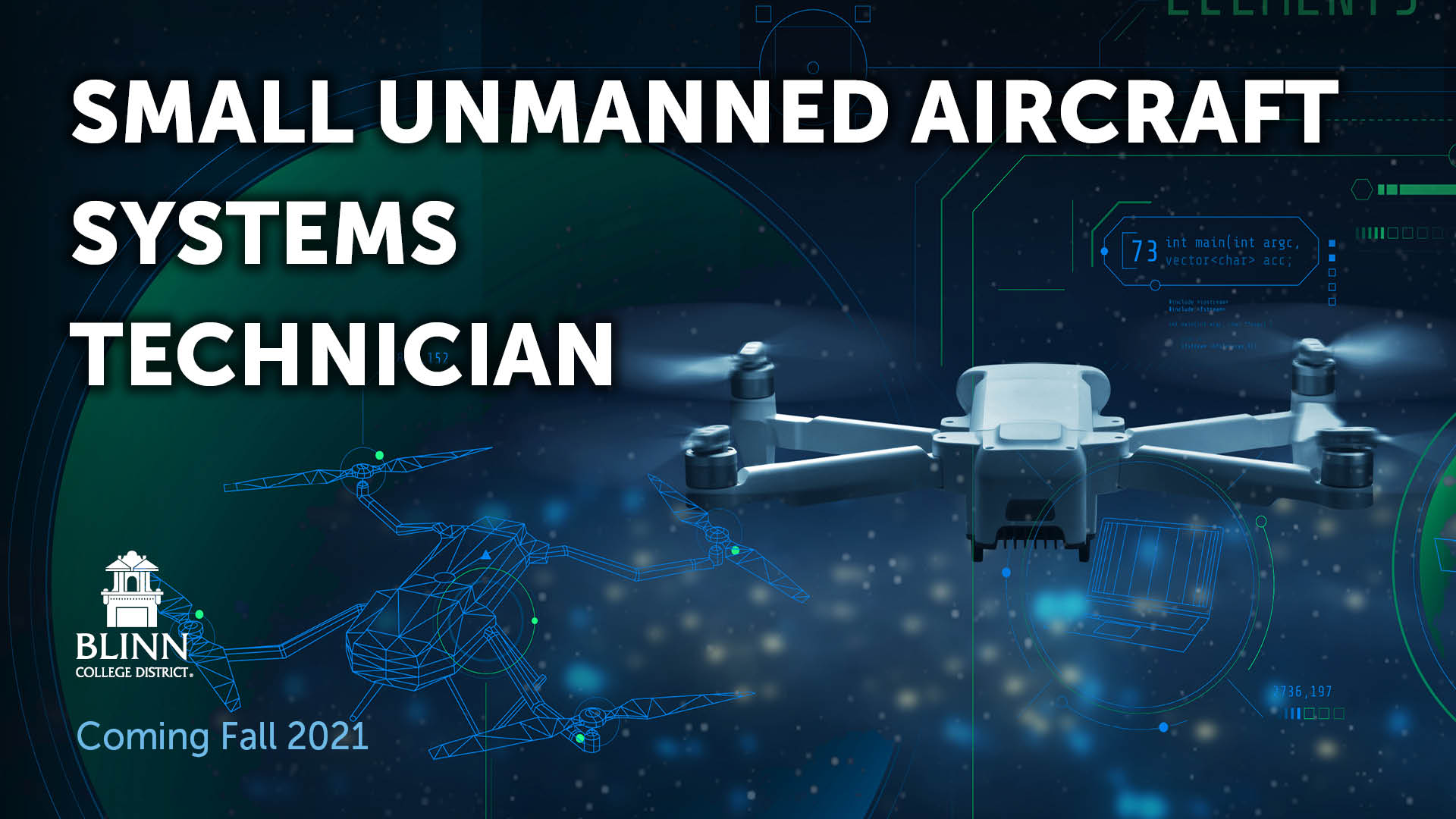Blinn launching new AAS degrees in Simulation and Game Programming and Small Unmanned Aircraft Systems Technician
Both programs are scheduled to launch this Fall

March 10, 2021
The Blinn College District Board of Trustees has authorized two high-tech degrees for launch during the Fall 2021 semester.
Pending approval from the Texas Higher Education Coordinating Board and Southern Association of Colleges and Schools Commission on Colleges, Blinn will introduce Associate of Applied Science degrees in Simulation and Game Programming and Small Unmanned Aircraft Systems Technician. Both degrees will launch on the Brenham Campus this Fall, then expand to the RELLIS Campus when the new Phase II academic building opens in Fall 2022.
“These new, cutting-edge degrees will prepare Blinn College students for the fast-growing technological careers that are defining the future,” said Dr. Mary Hensley, Chancellor of the Blinn College District. “With the introduction of these degrees and the opening of the new science, technology, engineering, and innovation building on the Brenham Campus, Blinn offers an unparalleled environment for students ready to pursue the next generation of high-tech careers.”
Jay Anderson, Vice Chancellor for Health Sciences, Technical Education, and Community Programs, said, “This is another success story of the Blinn College District adding high-wage, high-demand, high-technology programs to the offerings of occupational pathways to our district, making Texas stronger as it attracts new business through economic development.”
Both programs will be offered in the new Brenham Campus science, technology, engineering, and innovation (STEI) building on the Brenham Campus when it opens this Fall. The new facility will provide expanded laboratory space for Blinn’s science, engineering, and health science programs, and will create space for high-demand programs in new and emerging technologies.
Three stories tall and spanning 72,000 square feet, the STEI building will feature 17,000 square feet of laboratory space and a 3,000-square-foot innovation center that will include a 3D printing lab, soldering space, robotics area, and a space where students can work with interrelated computing devices. The innovation lab also will include a virtual reality space and a high-tech fabrication shop where students can use laser cutters to make precisely fitted materials.
SIMULATION AND GAME PROGRAMMING
The 60-credit-hour Associate of Applied Science Degree in Simulation and Game Programming is designed for students seeking careers in video game design and testing, television and film production, medical and scientific simulation, industrial animation and training, aeronautic and transportation industries, architecture and landscape design simulations, forensics, engineering simulations, education, government, and much more.
Through this program, students learn modern game programming languages, game prototyping, game design, game production, game maintenance, iOS development, APIs and libraries, operations analysis, and critical thinking. Proposed courses include Introduction to Game Design and Development; Programming Fundamentals I and II; Level Design I and II; Game and Simulation Programming I, II, and III; Project Development I and II; Project Development I, iOS Application Programming; Game Scripting, and Portfolio for Game Development.
“This robust curriculum prepares students for a wide range of career opportunities and immediately makes Blinn’s one of the most comprehensive programs in the state,” said Max Hibbs, Dean of Engineering, Computer Technology, and Innovation.
Blinn has named Dr. Bruce Gooch the Program Coordinator. Gooch was a Professor of Computer Science at Northwestern University from 2003 to 2006 and has been a Professor of Computer Science at the University of Victoria since 2006. He has published more than 50 research papers on computer graphics and is the author of the first book on non-photorealistic rendering. Gooch and his students have started 21 companies, including four that have generated multi-million-dollar revenues: Insatiable Genius, Toon-FX, GasLamp Games, and DJ Arts Games.
SMALL UNMANNED AIRCRAFT SYSTEMS TECHNICIAN
The 60-credit-hour Small Unmanned Aircraft Systems Technician Associate of Applied Science Degree provides instruction in the maintenance, customization, acquisition, and commercial use of small unmanned aircraft systems (sUAS), or drones. Students learn the concepts required to become a professional in the field, including electronics, mechanical design, and programming, and obtain specialized knowledge in unmanned aircraft systems, including flight, design, policy, and mission planning.
“This is an emerging, cutting-edge career path and Blinn is the only institution in the state offering a program of this type that incorporates both technician and flight training,” Hibbs said.
Through this program, students learn design and fabrication; drone flight skills and operations; electronics; aerodynamics; flight theory for small unmanned aircrafts; the operation of digital systems; anti-collision sensors; vision and GPS systems; 3D printing; drone customization; field repairs; design and flight safety; and explore business opportunities. Proposed courses include Drone Flight Training and Operations, Introduction to Computer Programming (Python), Flight Theory: Small Unmanned Aircraft (Federal Aviation Administration Part 017 Remote Certification Training), Aerodynamics, Engineering Graphics I, Information Technology Security, Electromechanical Systems: Build, Fabricate, Build a Drone, Digital Systems, Microcomputer Control, Sensors, and Vision Systems.
Professionals trained in the maintenance and operation of sUAS are employed across a wide range of fields. Students can choose electives in a field of interest, including aerial photography, air and rescue, agriculture and forestry, construction, facilities and structure inspection, firefighting, law enforcement and disaster response, military and defense, oil and gas, and transport and delivery.
Enjoy this article? Share it with one click!